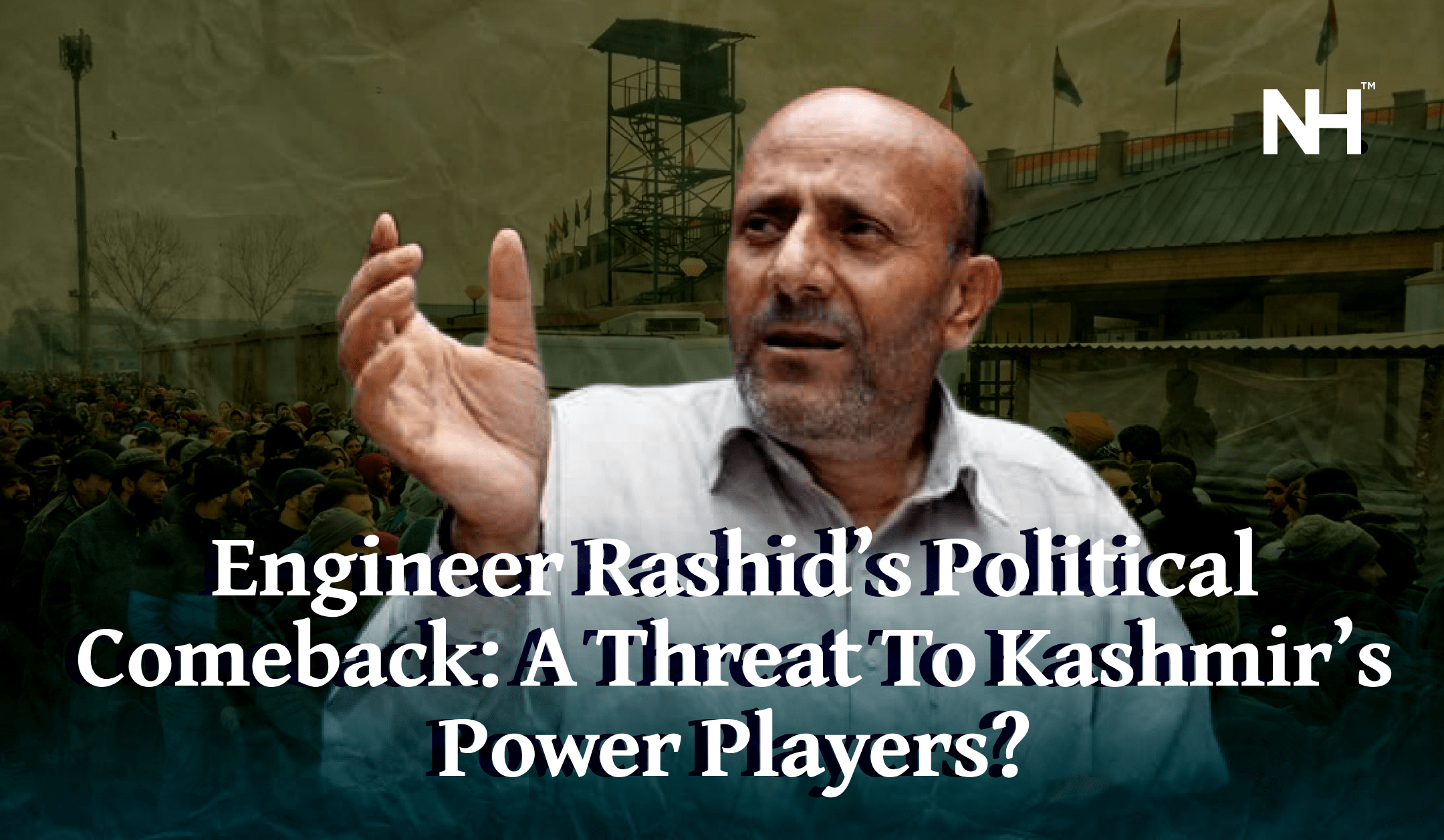In the politically charged landscape of Jammu and Kashmir, the sudden release of Sheikh Abdul Rashid, popularly known as Engineer Rashid, could become the most dramatic twist ahead of the Jammu and Kashmir assembly elections. After being in Tihar Jail for four years under accusations of terror funding, Rashid walked free on September 11, 2024, with a mission: to dismantle Prime Minister Narendra Modi’s “Naya Kashmir” narrative. His interim bail, granted just days before the polls, is more than just a legal reprieve—it’s a political thunderbolt that could alter the dynamics of the region’s upcoming elections.
Rashid’s re-entry into the political arena is not just the return of a jailed leader; it represents a potential game-changer in an already fragmented electoral contest. The question now is, will this firebrand politician, whose arrest made headlines in 2019, reignite his political career and reshape the Kashmir political landscape?

Engineer Rashid out on bail
Rashid’s Bail: A Political Tool?
Rashid’s release has fueled speculation about the timing and intent behind the court’s decision to grant him interim bail until October 2. Critics, including National Conference (NC) vice-president Omar Abdullah, have been quick to call it a tactical move designed to sway votes in the upcoming elections. Abdullah, who faced a shocking defeat at the hands of Rashid in the 2024 Lok Sabha elections, didn’t hold back in accusing the BJP of using Rashid as a political tool. He commented, “This bail has not been granted to serve the people but to fetch votes.”
The timing certainly raises questions. With the assembly elections—J&K’s first in a decade—beginning on September 18, Rashid’s return to the campaign trail offers him a narrow window to energise his base and influence the outcome. His party, the Awami Ittehad Party (AIP), is contesting several seats, and his sudden freedom could have ripple effects across the region.
The Rashid Factor: Disrupting Established Powers
Rashid’s political identity is deeply rooted in his fiery opposition to the status quo. He has consistently positioned himself as the voice of the “common Kashmiri” and has openly opposed the Modi government’s policies, particularly the revocation of Article 370 in 2019. Upon his release, he wasted no time in attacking Modi’s vision for the region. “I will fight PM Modi’s narrative of ‘Naya Kashmir,’ which has failed,” Rashid declared, signaling his intention to mount a direct challenge to the ruling party’s vision for the region.

Omar Abdullah
But how disruptive can Rashid really be? His 2024 Lok Sabha victory over former Chief Minister Omar Abdullah showcased his significant electoral clout. His ability to tap into the frustrations of everyday Kashmiris—especially the youth—cannot be underestimated. Many voters see him as a crusader for human rights, particularly in a region where security forces have often been accused of abuses. Rashid’s release and the opportunity to campaign on his party’s manifesto, which promises a “jail-free Kashmir” and the revocation of oppressive laws like the Public Safety Act (PSA) and UAPA, may draw younger voters looking for radical change.
Mehbooba Mufti
However, Rashid’s detractors, including Mehbooba Mufti of the People’s Democratic Party (PDP), accuse him of being a proxy for the BJP. Mufti’s criticisms have added fuel to rumors that the AIP leader’s release is part of a larger political strategy to divide the opposition vote. Her comments about Rashid being allowed to campaign while others remain behind bars highlight the contradictions within Kashmir’s political fabric.
A Vote for Change or a Vote Split?
The political landscape in Jammu and Kashmir is already fraught with uncertainty, and Rashid’s return adds another layer of unpredictability. His presence could potentially erode the voter base of more established parties like the NC and PDP, which have traditionally dominated Kashmiri politics. Analysts believe that Rashid’s rhetoric—focusing on human rights and self-determination—will resonate with those disillusioned by mainstream parties. His direct challenge to the BJP’s “Naya Kashmir” narrative provides voters with a clear, alternative vision, albeit one fraught with risks.
At the same time, there’s a real possibility that Rashid’s candidacy could split the opposition vote, inadvertently aiding the BJP’s attempts to secure a foothold in Kashmir’s assembly. The BJP has long sought to project its vision of development and integration in the region but has struggled to gain traction in the Valley. Rashid’s popularity could fragment the electorate, making it harder for the NC and PDP to consolidate votes against the BJP and its allies.
AIP’s Growing Influence: More Than a One-Man Show?
While Rashid’s release has captured national headlines, his party, the AIP, has been quietly expanding its influence. The party’s recent growth, including the addition of former Kashmir Chamber of Commerce and Industry chairman Sheikh Ashiq, suggests that Rashid is building a coalition that could surprise many in the upcoming elections. The AIP’s decision to contest three dozen seats in Kashmir is a clear indication that it sees itself as a serious contender in the region’s politics, not just a fringe player.
Abrar Rashid
Moreover, Rashid’s son, Abrar, has been leading the party’s campaign in his absence, ensuring that the AIP remains visible and active on the ground. This multi-generational push could energize the younger electorate, who are increasingly disillusioned with Kashmir’s traditional political elites. The party’s focus on issues such as human rights, economic development, and self-determination positions it as a potential disruptor in the polls.
The Road Ahead: Uncertainty and Opportunity
As the assembly elections approach, the political future of Jammu and Kashmir remains uncertain. Rashid’s release on interim bail has already injected new energy into an already tense electoral race, but whether this will translate into meaningful gains for the AIP remains to be seen. His fiery rhetoric and opposition to Modi’s policies could help galvanise voters who feel left behind by the BJP’s narrative of progress and peace in Kashmir.



















































































